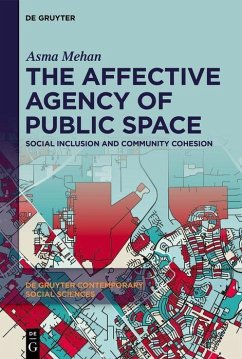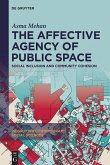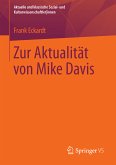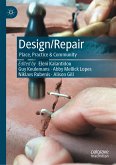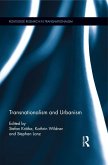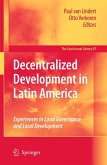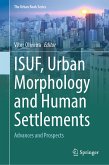The Affective Agency of Public Space explores the pivotal role that public spaces play in fostering social inclusion and community cohesion within various settings, including Europe and the United States. This scholarly work underscores the critical importance of developing inclusive public zones that enhance urban life and promote integration and interaction among diverse community groups. It also confronts and debunks common myths about 'different people,' actively addressing misconceptions while promoting the recognition of diverse identities and voices. Through a comparative lens, the book presents insightful case studies that illustrate its core themes. Serving as a timely and important academic resource, this text is indispensable for urban planners, educators, architects, designers, and sociologists committed to progressive urban planning methodologies.
Dieser Download kann aus rechtlichen Gründen nur mit Rechnungsadresse in A, B, BG, CY, CZ, D, DK, EW, E, FIN, F, GR, HR, H, IRL, I, LT, L, LR, M, NL, PL, P, R, S, SLO, SK ausgeliefert werden.
"Asma Mehan's book explores the relevance of a high-quality, walkable public space network that offers the urban stage for social encounter and dialogue. It uses comparative case study analysis to investigate two great cities: Amsterdam and Houston. Read it!"
Steffen Lehmann, University of Nevada, Las Vegas
"The physical and cultural interaction between public space and mixed social, ethnic, and religious groups is a crucial issue for cities in the early 21st century. At the crossroads of urban studies and architectural theory, Asma Mehan's volume offers an essential contribution to understanding those practices involving public spaces' occupation by citizens of various backgrounds and the intervention of effective governance by authorities in Europe and the United States. Henceforth, anyone dealing with multicultural cities will have a formidably effective investigation and interpretation tool."
Sergio Pace, Politecnico di Torino
Steffen Lehmann, University of Nevada, Las Vegas
"The physical and cultural interaction between public space and mixed social, ethnic, and religious groups is a crucial issue for cities in the early 21st century. At the crossroads of urban studies and architectural theory, Asma Mehan's volume offers an essential contribution to understanding those practices involving public spaces' occupation by citizens of various backgrounds and the intervention of effective governance by authorities in Europe and the United States. Henceforth, anyone dealing with multicultural cities will have a formidably effective investigation and interpretation tool."
Sergio Pace, Politecnico di Torino

